
President Trump has inflamed tensions over immigration raids in Los Angeles, which his top adviser Stephen Miller described as an insurrection. “They want protesters to react violently to distract from what is really happening, which is that families are being separated, our communities are being devastated, and the people of Los Angeles are standing up to say, 'We will not stand for this,'” says Jean Guerrero, New York Times contributing opinion writer and author of Hatemonger: Stephen Miller, Donald Trump, and the White Nationalist Agenda. Meanwhile, she notes Trump’s budget bill would fund a massive expansion of federal immigration enforcement and turn it into a threat to the civil rights of everyone.
Transcript
AMY GOODMAN: We begin today’s show in Los Angeles as the Trump administration sends more troops into the city following four days of protests against military-style immigration raids. The Pentagon has deployed 700 Marines to Los Angeles, and President Trump has deployed an additional 2,000 members of the National Guard, bringing the total National Guard members to 4,000. On Monday, the state of California sued to block the use of National Guard troops. We’ll speak to California’s Attorney General Rob Bonta later in the broadcast. On Monday, Los Angeles Mayor Karen Bass decried the militarized response.
MAYOR KAREN BASS: We didn’t need the National Guard. Why on Earth? What are they going to do? Do you know what the National Guard is doing now? They are guarding two buildings. They are guarding the Federal Building here, in downtown, and they’re guarding the Federal Building in Westwood. That’s what they’re doing. So, they need Marines on top of it? I don’t understand that. That’s why I feel like we are part of an experiment that we did not ask to be a part of.
AMY GOODMAN: Despite the Trump administration’s militarized response, community protests against ICE raids are continuing in Los Angeles and other cities. In fact, on Saturday, the day that President Trump will be celebrating his 79th birthday, and there will be Abrams tanks in a birthday parade in Washington, D.C., rolling through the streets of the capital.
We go now to Los Angeles, where we’re joined by Jean Guerrero. She’s contributing opinion writer at The New York Times and author of the book Hatemonger: Stephen Miller, Donald Trump, and the White Nationalist Agenda.
Jean, why don’t we start off by you describing the protests on the streets? Have you been to them? And talk about this unprecedented use of military power, and the Republican Party, the party that champions states’ rights, President Trump going against the state’s rights to bring in the U.S. military, against the wishes of the local mayor, Karen Bass, and the governor of California, Governor Newsom.
JEAN GUERRERO: Absolutely, Amy. It’s great to be here.
I want to be clear about what is happening here. The federal government is going into the diverse communities of Los Angeles to terrorize them. They are showing — ICE is showing up outside of schools, outside of Home Depots, outside of other workplaces. They’re snatching people off of the streets, off of their — outside of their homes, in front of their children, often without warrants.
But what’s happening in these protests is that people of all races and backgrounds are putting their bodies on the line to protect their friends, their neighbors, their family members from these arrests. And it is a beautiful thing to see. I was just at one of the protests yesterday, where I spoke to grandmothers, you know, white grandmothers, who are going out to protect people that they love and who they’re afraid could be picked up by ICE. I spoke to Latinas who are, you know, afraid of being racially profiled and arrested because of the indiscriminate nature of these arrests, but they are nevertheless putting their bodies on the line, because they’re citizens and they believe in using their privilege to defend the people that they care about.
And these protests have been largely peaceful. You know, these are people who want to tell ICE that they are not welcome in their communities. And what we’re seeing is a provocation. You know, the deployment of the National Guard and the Marines against the wishes of California’s leaders, it is an attack on the sovereignty of the state of California, and it is an effort to provoke Angelenos into a violent confrontation. They want protesters to react violently to distract from what is really happening, which is that, you know, families are being separated, our communities are being devastated, and the people of Los Angeles are standing up to say, “We will not stand for this.” But the administration is trying to bait them into violence, to brand them as rebels and justify sweeping federal crackdowns and to create the viral images that will distract Americans from the appalling reality that ICE is kidnapping valued community members and destroying families here in Los Angeles.
JUAN GONZÁLEZ: And, Jean, you’ve posted on social media, quote, “Trump’s immigration agenda is not about law and order. It’s about re-engineering the racial demographics of this country.” Could you elaborate, especially in terms of the fact that Stephen Miller, Trump’s key adviser, has called this a “fight for civilization”?
JEAN GUERRERO: Yeah. You know, this crackdown is personal for Stephen Miller. As I report in my book, Hatemonger, when he was a high school student in Los Angeles, he frequently antagonized his Latino and immigrant classmates, telling them to, quote, “speak English” and to go back to their home countries. Back then, he was criticized for his views, and he has spent his career trying to punish the communities that rejected him.
These mass deportations are not about border security. They’re not about crime. They’re about erasing the multicultural fabric of places like Los Angeles. And, you know, I want to repeat that this is not about cracking down on crime. Let’s remember that on his first day in office, President Trump pardoned the people who violently assaulted law enforcement during the storming of the Capitol on January 6th. So, Trump and Miller are not against crime. They’re not against gang members. In fact, in my book, I extensively document Miller’s early dreams of being a gangster. What they’re doing is they’re running a mafia state that scapegoats immigrants as a pretext for the subjugation of us all.
So, again, they do not care about law and order. Miller’s central obsession was never illegal immigration. It was always legal immigration. This is why, from day one, you saw the strangling of refugees — access to refugees, a suffocation of the asylum system, strangling of green card access, the attack on birthright citizenship, trying to now invoke the Insurrection Act to deport people indiscriminately, simply based on the color of their skin. So, again, this is not about national security. It is an ideological project of demographic engineering cloaked in the language of law enforcement. And L.A. is resisting.
JUAN GONZÁLEZ: And could you talk about the number of journalists who have also been injured by law enforcement these past few days in Los Angeles?
JEAN GUERRERO: Yes. Several journalists, including colleagues of mine, have been hit with nonlethal rounds. Some have been hospitalized. I believe PEN America has recorded at least 27 attacks on L.A. journalists since June 6th. Reporters are being shot with rubber bullets and chemical munitions. And this is very concerning, because these so-called nonlethal rounds can, in fact, be fatal. The respected Chicano journalist Rubén Salazar was killed with a tear gas canister in 1970 while covering protests here in L.A., and that memory lingers for journalists here in the city, especially for Latino journalists who are trying to expose the injustices that are happening in their communities.
AMY GOODMAN: Jean Guerrero, if you can talk about what is happening in — Los Angeles right now is where all of the attention is, because of this unprecedented calling out by Trump and Hegseth, the defense secretary, of the Marines and thousands of National Guard, federalizing them. But, in fact, this is happening all over the country. If you can talk more about the two men you wrote a book about, your book, Hatemongers: Stephen Miller, Donald Trump, and the White Nationalist Agenda? You have Stephen Miller saying that the ICE agents have to go to 7-Elevens, have to go to Home Depots — this is very different than Trump talking about getting the murderers and rapists — and bringing up the number to 3,000 arrests a day. So, you see mass arrests taking place in Texas. You see them in Arizona. We’re not even at this point paying attention because of the militarization of Los Angeles.
JEAN GUERRERO: Exactly, yeah. I mean, what you’re seeing is sort of exponentially what we saw during the first administration, which is resources are being diverted from serious homeland security investigations, from serious drug trafficking and human trafficking investigations, to try to meet these quotas of human beings rounded up to satisfy Miller’s appetite for cracking down on immigrants, whether they’re legal or whether they’re here illegally.
And one thing that has not gotten enough attention and which I want to underscore is that what’s happening in L.A. is people are risking their safety not only to resist what is happening, not only to resist these kidnappings of their valued community members, but to document and to expose and to bear witness to what is happening. They’re recording videos of mothers being torn from their children, being arrested outside of courthouses, of pregnant women being roughed up on the streets and being detained, of fathers being separated from their weeping daughters. And these images are crucial, because each act of documentation is chipping away at the alternate reality that Trump and Stephen Miller have created, this alternate reality in which they are cracking down on gangsters and rapists and serious criminals. I cannot emphasize the importance of this enough.
The administration is ramping up deportations to a never-before-seen level, which means that they are more visible than ever. They used to happen in the shadows. Now people can can see it happening everywhere. And people are taking out their phones. They’re recording what’s happening to their family members, to their friends, you know, to their neighbors down the street. And as a result, these deportations, these arrests are becoming much harder to misrepresent, and this is a threat to the narrative that Trump and Stephen Miller have spent years putting out there.
And so, I really believe that if Los Angeles refuses to be baited into violence, and instead stays disciplined and continues to dedicate themselves to relentless exposure of how ICE is kidnapping innocent people and what they’re actually doing to valued members of our community, I think this can all end up backfiring on the Trump administration, and that Trump’s attempt to provoke chaos in our communities will end up collapsing under its own cruelty.
JUAN GONZÁLEZ: And, Jean Guerrero, I wanted to ask you about the conflict, obviously, that has arisen between the elected officials in California and the Trump administration. You know, I was there as a reporter back in 1992 at the Los Angeles riot back then. And there really is no comparison between the events of the past weekend and 1992. Back then, 60 people — more than 60 people were killed, 12,000 were arrested, over a thousand buildings were damaged. And even by the time that President George H.W. Bush brought in the National Guard, 30 people had already been killed. And he did so at the request of a Republican governor, Pete Wilson, and a Democratic mayor, Tom Bradley. Talk about the difference between how the elected officials are responding here and the excuse that Trump has used to call in the National Guard and the Marines.
JEAN GUERRERO: Yeah, absolutely. I mean, a majority of these protests are peaceful, as I mentioned. You know, you see children at these rallies. These are demonstrations of people who are simply trying to peacefully demonstrate and tell the federal government that they do not want these kidnappings of the people that they love in Los Angeles.
The last time that you had a president issue this — you know, send the National Guard against the governor’s wishes, I believe, was in 1963 to enforce desegregation in Alabama. So, it is really unprecedented. And honestly, it’s textbook authoritarianism. I mean, you now see, you know, Trump talking about arresting Newsom and other California leaders. And on the one hand, this is shocking, but on the other, it’s completely predictable. I mean, this is what authoritarian governments do. They use immigrants as a pretext to go after the opposition. And immigrants are just the first target. If you look at the white nationalist literature that inspired people like Stephen Miller, it vilifies not only law-abiding immigrants, but anyone who defends them. The worst villains are not immigrants in this literature, even though they are described as monsters and as beasts and as threats to Western civilization. The worst villains in this literature — and I’m talking about books like The Camp of the Saints, which Stephen Miller has openly promoted — the worst villains are the white allies of immigrants, the politicians and the activists and the ordinary people who show them empathy. Those are the people who are, quote, “tainted by the milk of human kindness,” as one of Miller’s formative books puts it.
And so, the logical conclusion of Trump’s policies is not just ethnic cleansing, it is ideological cleansing. It’s a purge not just of people, but of principles. They want to root out anyone who believes in compassion for the stranger, who believes in immigrant rights, who believes in a multicultural or multiracial democracy. This is a vision of America where you are American only if you choose hate. And if you choose love or compassion, you are part of what is poisoning the blood of this country. And so, I’m not surprised to see the president coming after innocent people who are not just the immigrants in our communities, but the people who are defending them, who are white, who are Black, who are Brown, who are of all different colors, and who are simply expressing their humanity and their compassion for the other.
AMY GOODMAN: Jean Guerrero, you contributed to a New York Times piece Monday headlined “Seven Hidden Ways Trump’s Megabill Would Remake America,” in which you wrote, quote, “This bill would pave the way for the largest investment in federal immigration enforcement since the establishment of the Department of Homeland Security in 2002 — one that would turn that department into a Trojan horse for an assault on the civil rights of all Americans.” Can you lay out your concerns? We just have a minute.
JEAN GUERRERO: Absolutely. So, nearly two-thirds of Americans live in what is known as the 100-mile border enforcement zone, where people, under this bill — I mean, they already face the risk of warrantless seizures, of racial profiling, of constant surveillance, and this bill just makes it easier and more certain that all Americans in this country, and particularly if you live within that zone, are going to not be able to walk on the street without fear of being detained. You already have detentions and deportations of U.S. citizens, of law-abiding immigrants, without due process. And I think what this bill is doing is it’s providing the government with the resources to be able to continue to do that at levels that we have never before seen in this country.
AMY GOODMAN: Jean Guerrero, I want to thank you very much for being with us, New York Times contributing opinion writer and author of Hatemonger: Stephen Miller, Donald Trump, and the White Nationalist Agenda, speaking to us from Los Angeles.
Coming up California’s Attorney General Rob Bonta. He’s sued President Trump for deploying the National Guard in L.A. Stay with us.
[break]
AMY GOODMAN: “If I Was President” by the East L.A.-based Las Cafeteras, performing here in our Democracy Now! studio.

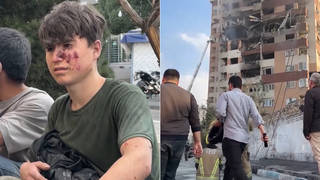
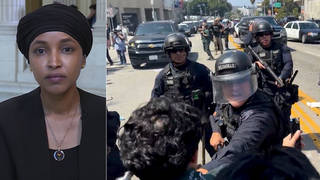
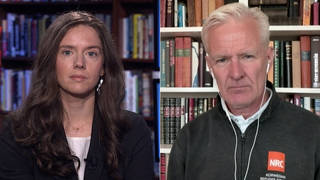

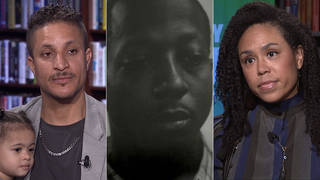


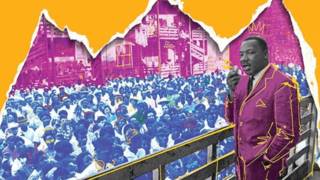


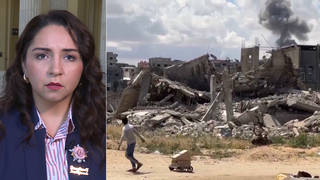
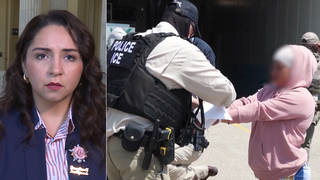
Media Options